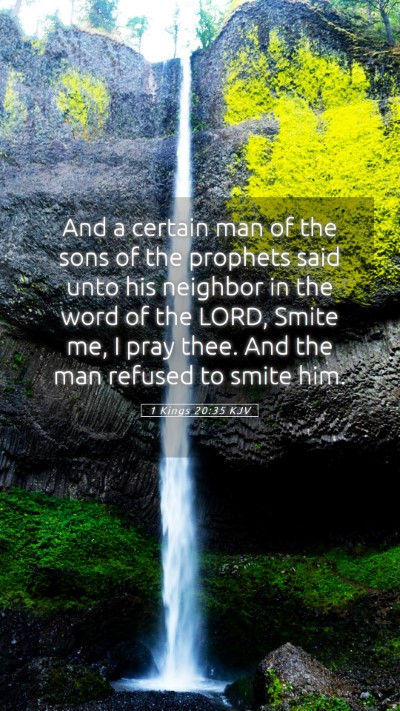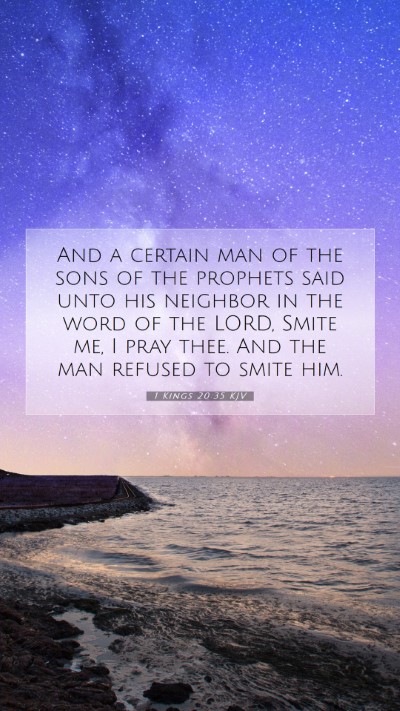Understanding 1 Kings 20:35
Bible Verse: 1 Kings 20:35 - "And a certain man of the sons of the prophets said unto his neighbour in the word of the LORD, Smite me, I pray thee. And the man refused to smite him."
Contextual Background
The historical backdrop of 1 Kings 20 involves the reign of Ahab, king of Israel, and his encounters with the Aramean king Ben-Hadad. The narrative details various battles and God's intervention on behalf of Israel. In this particular verse, we find a prophet engaging with another, seeking to exemplify a divine message through symbolic action.
Summary of Meaning
This verse encapsulates a moment where a prophet, compelled by God, asks another to strike him. The refusal of the neighbor signifies disobedience not just to the prophet but to the divine command that underlies the action. The profound implications here raise questions about obedience, prophetic symbolism, and the nature of God's directives.
Commentary Insights
-
Matthew Henry:
Henry describes the poignant tension in this request, emphasizing how the prophet’s command is rooted in divine instruction. He notes that the refusal reflects a broader theme of disobedience in Israel's history, where God’s messengers often faced rejection. This act symbolizes the coming judgment upon Israel, demonstrating how the prophet's experiences serve as an allegory for the nation's spiritual state.
-
Albert Barnes:
Barnes highlights the significance of obedience to divine commands, even when such commands seem harsh or difficult. He suggests that the interaction demonstrates the critical importance of understanding God’s will as revealed through his prophets. The refusal serves as a commentary on the broader disobedience within Israel, inviting readers to ponder the seriousness of rejecting God’s word.
-
Adam Clarke:
Clarke adds a theological layer by framing the verse within the context of prophetic fidelity to divine instruction. He indicates that the refusal of the neighbor to obey the prophet signifies not just personal disobedience, but a reflection of the wider nation’s estrangement from God’s will. Clarke emphasizes how this moment foreshadows severe consequences for Israel due to their rebellion against God.
Application and Significance
The implications of this verse extend into modern applications for believers. It invites reflection on the nature of obedience to God’s word and the repercussions of disregarding divine instructions. This moment also serves as a reminder of the challenges faced by those who speak truth and the potential for misunderstanding or rejection by those around them.
- Obedience to God's Voice: This verse challenges readers to evaluate their own responsiveness to God's call and the messages conveyed through His servants.
- Importance of Prophecy: The role of prophets in biblical narratives illustrates how God communicates His will to humanity, stressing the need for discernment and willingness to obey.
- Symbolic Actions in Scripture: This account showcases how actions in biblical texts often carry deep spiritual meanings, encouraging believers to explore the significance behind scriptural narratives.
Related Bible Cross References
- Jeremiah 1:10 - The calling of Jeremiah where God instructs him to uproot and tear down, reflecting similar themes of prophetic obedience.
- 2 Chronicles 18:13 - The account of prophets and their messages highlighting the role of God's chosen messengers.
- 1 Samuel 15:22 - Samuel's proclamation on the necessity of obeying God over sacrifice emphasizes the value of obedience.
Conclusion
This exploration of 1 Kings 20:35 amplifies its relevance in the broader scriptural narrative, urging readers to consider the weight of obedience to God and how it manifests in both ancient and contemporary contexts. Through this verse, believers are encouraged to delve deeper into biblical study, reflecting on how lessons drawn from historical narratives can apply to their own faith journeys.
Additional Insights for Study
For those interested in further exploration of Bible verse meanings, consider engaging with Bible study groups or using online Bible study tools. There are numerous Bible study resources that can assist in understanding Scripture in greater depth, including commentary collections, theological dictionaries, and interactive courses.


